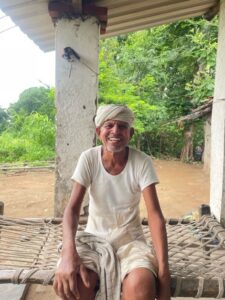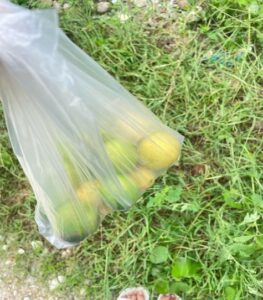Some field days are special. This is an account of one such day.
After a picturesque and a slightly nauseating ride, I finally reached our AMRIT Clinic in Ghated. It was a typical monsoon afternoon- dark clouds and gentle drizzle. There I was joined by our male health worker, Bheru ji and together we set out to interview Bhim Raj ji, a member of our clinic Advisory Council. Our goal was to understand  his experiences and gather his insights on the changes he has observed in the community over the years.
his experiences and gather his insights on the changes he has observed in the community over the years.
Following some off-roading on the bike and a walk through the farms, we reached Bhim Raj ji’s home. After a quick exchange of greetings, we settled into our seats. I introduced myself and explained the purpose of my visit.
We then delved into a conversation about the community—the changes in lifestyle, work, health, relationships, and the impact of superstitions on health. It was a wonderful interaction, filled with valuable insights. This blog, however, isn’t about the specifics of our conversation or the perspectives he shared—perhaps I’ll write another blog for that.
What stood out to me that day was Bhim Raj ji’s genuine curiosity. It was a refreshing change. He asked about my background, my studies, how long I’ve been working with BHS and living in Udaipur. When Bheru ji mentioned that I had travelled from Udaipur just to talk to him, he was surprised. Then he said something that will stay with me for a long time:
“People who are fearful can’t do this. You must be brave to move from one place to another. Those who are scared can’t talk to others; they worry, ‘How will I do this? What if something goes wrong?’ But you are working with your strength; you are speaking with your wisdom.”
“When you move out of your home, with every failure you face, it’s like chipping away at a rock. One day, you will break a mountain.”
I moved out home when I was 16 and have lived in various places for studies and now for work. In all these years I never considered what I was doing to be particularly courageous. But Bhim Raj ji called me brave for coming so far. Though he was referring to my journey from Udaipur, his words held a much deeper meaning for me. They reassured me and grounded me. As the interview was coming to a close, he asked if I’d like a cup of tea. Under normal circumstances, I would have happily accepted, but that day, I was feeling a bit queasy from motion sickness. The moment I mentioned how I was feeling, he immediately asked if I would like some nimbu paani.
I hesitated to accept, not wanting to trouble his family any further. But he was insistent and called for his son to fetch some lemons from their backyard. Without a second thought, his son quickly got up to pluck lemons, while his daughter-in-law found a bag to put them in.
and called for his son to fetch some lemons from their backyard. Without a second thought, his son quickly got up to pluck lemons, while his daughter-in-law found a bag to put them in.
He then handed me a bag full of lemons. I hesitated, explaining that I lived alone and wouldn’t know what to do with so many lemons. But he insisted, saying, “Take them with you. When you reach the clinic, ask someone there to make you some lemonade.”
For someone who said, he didn’t have much, he offered me a lot that day.
So, I returned with a bag of lemons in my hand and a smile on my face. Later, on the drive back to Udaipur, I found myself reflecting on the day’s encounter. I realized that we, as humans, have an immense capacity to give—whether it’s empathy, love, a listening ear, a few kind words, a shared perspective, or simply a smile. It’s not about what we have in terms of material possessions, but rather the intent and willingness to connect and share with others.
It was also a reminder that our work in communities goes beyond healthcare. It’s about the relationships we build, the respect we exchange, and the unexpected wisdom we encounter that fuels our drive to keep pushing ahead, even when the road gets tough.
That day, I left Ghated feeling grateful and inspired.
Written by Ashmita Gulechha, Research Assistant, BHS
